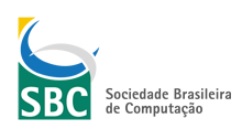Transporte de Agentes Cognitivos entre SMA Distintos Inspirado nos Princípios de Relações Ecológicas
Resumo
Na biologia, os seres vivos são capazes de estabelecer relações que são classificadas de acordo com o comportamento dos envolvidos. Agentes são entidades autônomas capazes de tomar decisões, raciocínio cognitivo e socializar com outros agentes em um Sistema Multi-Agente (SMA). Alguns agentes são capazes de se moverem para outros SMA, podendo, assim, se relacionar com outros agentes, de forma similar aos seres vivos. Este trabalho tem como objetivo propor protocolos inspirados nas relações biológicas com a finalidade de explorar a movimentação de agentes de um SMA embarcado em um dispositivo físico e autônomo para outro SMA em um dispositivo distinto. Serão abordados três protocolos: predatismo, mutualismo e inquilinismo, onde a transferência é feita com o objetivo de dominar, trocar conhecimentos e sobreviver no SMA de destino, respectivamente. Estes protocolos visam preservar e/ou compartilhar os conhecimentos obtidos durante a existência dos agentes. Neste caso, um SMA pode utilizar um dos protocolos para migrar para outro sistema embarcado. Por fim, serão apresentados alguns experimentos iniciais, nos quais foram criados dois protótipos (um líder e um hospedeiro) onde o líder é danificado e a relação de predatismo é acionada para preservar os conhecimentos adquiridos.
Referências
Bellifemine, F. L., Caire, G., and Greenwood, D. (2007). Developing multi-agent systems with JADE, volume 7. John Wiley & Sons.
Bordini, R. H., Hübner, J. F., and Wooldridge, M. (2007). Programming Multi-Agent Systems in AgentSpeak using Jason. John Wiley & Sons Ltd.
Bratman, M. E. (1987). Intention, Plans and Practical Reasoning. Cambridge Press.
Calvo, R. (2012). Sistemas bio-inspirados para coordenaçao de múltiplos robôs móveis. PhD thesis, Universidade de São Paulo.
Chebout, M. S., Mokhati, F., Badri, M., and Babahenini, M. C. (2016). Towards preventive control for open mas - an aspect-based approach. In Proceedings of the 13th International Conference on Informatics in Control, Automation and Robotics - Volume 1: ICINCO,, pages 269–274. INSTICC, SciTePress.
David, L., Vasconcelos, R., Alves, L., André, R., Baptista, G., and Endler, M. (2012). A communication middleware for scalable real-time mobile collaboration. In Enabling Technologies: Infrastructure for Collaborative Enterprises (WETICE), 2012 IEEE 21st International Workshop on, pages 54–59. IEEE.
Dong-Huynha, T., Jennings, N., and Shadbolt, N. (2004). Fire: An integrated trust and reputation model for open multi-agent systems. In ECAI 2004: 16th European Conference on Artificial Intelligence, August 22-27, 2004, Valencia, Spain: including Prestigious Applicants [sic] of Intelligent Systems (PAIS 2004): proceedings, volume 110, page 18.
Endler, M., Baptista, G., Silva, L., Vasconcelos, R., Malcher, M., Pantoja, V., Pinheiro, V., and Viterbo, J. (2011). Contextnet: context reasoning and sharing middleware for large-scale pervasive collaboration and social networking. In Proceedings of the Workshop on Posters and Demos Track, page 2. ACM.
Hübner, J. F., Bordini, R. H., and Vieira, R. (2004). Introdução ao desenvolvimento de sistemas multiagentes com jason. XII Escola de Informática da SBC, 2:51–89.
Lazarin, N. M. and Pantoja, C. E. (2015). A robotic-agent platform for embedding software agents using raspberry pi and arduino boards. In 9th Software Agents, Environments and Applications School.
Matarić, M. J. (2007). The robotics primer. Mit Press.
Ossowski, S., Julián, V., Bajo, J., Billhardt, H., Botti, V., and Corchado, J. (2007). Open mas for real world applications: An abstract architecture proposal. In Proc. XII Conference of the Spanish Association for Artificial Intelligence (CAEPIA), volume 2, pages 151–160.
Pantoja, C. E., de Jesus, V. S., and Filho, J. V. (2016a). Aplicando sistemas multi-agentes ubıquos em um modelo de smart home usando o framework jason. In II Workshop de Pesquisa e Desenvolvimento em Inteligência Artificial, Inteligência Coletiva e Ciência de Dados (Workpedia). Universidade Federal Fluminense.
Pantoja, C. E., Stabile Jr, M. F., Lazarin, N. M., and Sichman, J. S. (2016b). Argo: A customized jason architecture for programming embedded robotic agents. Fourth International Workshop on Engineering Multi-Agent Systems (EMAS 2016).
Sanchez-Anguix, V., Aydogan, R., Julian, V., and Jonker, C. M. (2012). Analysis of intra-team strategies for teams negotiating against competitor, matchers, and conceders. In The 5th International Workshop on Agent-based Complex Automated Negotiations (ACAN 2012), pages 1–8.
Stabile Jr., M. F. and Sichman, J. S. (2015). Evaluating perception filters in BDI Jason agents. In 4th Brazilian Conference on Intelligent Systems (BRACIS).
Tissot-Squalli, M. (2009). Interações ecológicas & biodiversidade. Unijuí.
Vasconcelos, I., Vasconcelos, R., Baptista, G., Seguin, C., and Endler, M. (2013). Desenvolvendo aplicações de rastreamento e comunicação móvel usando o middleware sddl. In Salão de Ferramentas, Brazilian Symposium on Computer Networks and Distributed Systems (SBRC 2013).
Wooldridge, M. (2009). An Introduction to MultiAgent Systems. Wiley.
Zhang, D., Ning, H., Xu, K. S., Lin, F., and Yang, L. T. (2012). Internet of things. J. UCS, 18:1069–1071.



